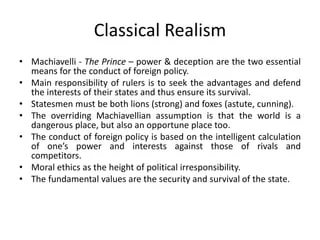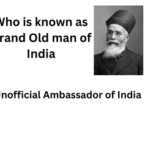Henry Kissinger ‘Realism’

Henry Kissinger whose name has been synonymous with the foreign-policy doctrine called “realism” died on Wednesday at age of 100. During Henry Kissinger’s tenure in office, a diplomatic powerhouse whose roles as a national security adviser and secretary of state under two presidents left an indelible mark on U.S. foreign policy. The usage of the word realpolitik spread throughout the governmental machine. It caught the imagination of the people — the belief that a nation must identify and act upon its interests rather than indulge in emotionally satisfying but politically numbing moral crusades.
Henry Kissinger was also awarded the Nobel Prize in 1973 for helping reach a deal during the Vietnam War. He advocated a policy of less hostile relations – what is called ‘detente’.
Kissinger’s Books: “A World Restored” “World Order”
LEARNING FROM HOME/ WITHOUT CLASSES / BASICS
REALISM
In the discipline of International Relations (IR), realism is a school of thought that emphasizes the competitive and conflictual side of international relations.
The first assumption of realism is that the nation-state is the principal actor in international relations. Other bodies exist, such as individuals and organizations, but their power is limited.
Second, the state is a unitary actor. National interests, especially in times of war, lead the state to speak and act with one voice.
Third, decision-makers are rational actors in the sense that rational decision-making leads to the pursuit of the national interest. Here, taking actions that would make your state weak or vulnerable would not be rational.
Finally, states live in a context of anarchy – that is, in the absence of anyone being in charge internationally.
Hans Morgenthau , one of the proponents of classical realism (1948) believed that politics, like society in general, is governed by laws that have roots in human nature. His concern was to clarify the relationship between interests and morality in international politics. In contrast to more optimistically minded idealists who expected international tensions to be resolved through open negotiations marked by goodwill, Morgenthau set out an approach that emphasized power over morality. Indeed, morality was portrayed as something that should be avoided in policymaking. In Morgenthau’s account, every political action is directed toward keeping, increasing or demonstrating power.
In Theory of International Politics (1979), Kenneth Waltz modernized IR theory, whose contribution was termed ‘neorealism’, by moving realism away from its unprovable assumptions about human nature. His theoretical or ‘structural realism’ because he emphasized the notion of ‘structure’ in his explanation. Rather than a state’s decisions and actions being based on human nature, they are arrived at via a simple formula. First, all states are constrained by existing in an international anarchic system (this is the structure). Second, any course of action they pursue is based on their relative power when measured against other states. Waltz’s variables (international anarchy, how much power a state has, etc.) can be empirically/physically measured. Ideas like human nature are assumptions based on certain philosophical views that cannot be measured in the same way.
Realism’s critics argue that realists can help perpetuate the violent and confrontational world that they describe. By assuming the uncooperative and egoistic nature of humankind and the absence of hierarchy in the state system, realists encourage leaders to act in ways based on suspicion, power, and force. Realism can thus be seen as a self-fulfilling prophecy. More directly, realism is often criticized as excessively pessimistic, since it sees the confrontational nature of the international system as inevitable.







0 Comments